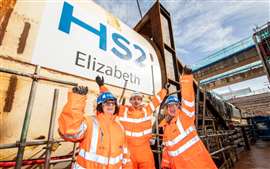Balfour Beatty Vinci JV tunnel boring machine starts last HS2 dig
07 March 2024
Balfour Beatty Vinci (BBV), a UK/France-based construction and infrastructure services joint venture (JV), announced its 1,600-tonne tunnel boring machine (TBM) – named Elizabeth – has started digging the its bore of the HS2 Bromford Tunnel, which will connect North Warwickshire to Birmingham, UK, as part of the high-speed rail scheme.
 Balfour Beatty VINCI’s tunnel boring machine in the West Midlands region of the UK. The unit started digging towards Birmingham as part of the HS2 rail project. (Image: Balfour Beatty)
Balfour Beatty VINCI’s tunnel boring machine in the West Midlands region of the UK. The unit started digging towards Birmingham as part of the HS2 rail project. (Image: Balfour Beatty)
The TBM is 125m long and will create the 5.6-km twin-bore tunnel, which will move trains in and out of Birmingham with the help of a series of viaducts navigating the city centre.
The unit is expected to finish its journey in autumn of 2025. It is the fourth and final TBM launch for the joint venture on this project.
Jules Arlaud, tunnelling director for BBV, said, “We’re now looking forward to having two machines underground, as this fascinating and complex stretch of the HS2 route inches another step closer to completion.”
The first TBM launched in June 2023 and has, thus far, tunnelled under the Park Hall Nature Reserve. It is currently near the River Tame and will proceed adjacent to the M6 roadway at a depth of 27m before breaking through at Washwood Health in Birmingham later this year.
“The full Bromford Tunnel programme is being delivered by around 450 people working for Balfour Beatty Vinci,” said a statement from the JV. “A specialist tunnelling team working for Balfour Beatty VINCI’s sub-contractors Tunnelcraft and Solihull-based Rorcon are operating both TBMs 24/7, with each bore taking around 16 months.”
The immense rail project, which has been escalating in price, is expected to finish by 2029.
How much are the HS2 tunnel borers doing?
According to BBV, “Both TBMs will remove a total of 1.87 million tonnes of excavated material, which is sifted at the on-site slurry treatment plant and reused on HS2’s nearby sites at Delta Junction, where a complex network of 13 viaducts is being built. [They] will put a total of 41,594 concrete segments in place, creating 5,942 rings to make the twin-bore tunnel.”
Each ring weighs 49 tonnes, and the concrete segments are produced at BBV’s pre-cast factory in Avonmouth near Bristol.
STAY CONNECTED



Receive the information you need when you need it through our world-leading magazines, newsletters and daily briefings.
CONNECT WITH THE TEAM








